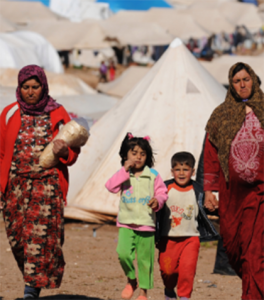Refugee resettlement plunges because of COVID – new data
Refugee resettlement has plunged to the lowest level in two decades because of the COVID-19 pandemic, according to a snapshot of new data from the United Nations’ refugee agency UNHCR.
Just 22,770 departures were recorded by the UNHCR last year despite an estimated 1.44 million refugees in need of resettlement.
 “Resettlement numbers in 2020 were the lowest in two decades as a result of low quotas set by states and interruptions to programs due to the COVID-19 pandemic,” the report said.
“Resettlement numbers in 2020 were the lowest in two decades as a result of low quotas set by states and interruptions to programs due to the COVID-19 pandemic,” the report said.
The US resettled the highest number of refugees in 2020 at 6,740, followed by Sweden at 3,543 and Canada at 3,496. UNHCR called on states to boost their resettlement programs in in 2021 to offer more places and speed up processing.
“We can only hope that 2020 will be an extreme anomaly for refugee resettlement. We urgently call on governments to boost their programmes this year, offer more places, expedite the processing of cases and help us save lives of those most in need and at greatest risk,” said UNHCR’s Assistant High Commissioner for Protection, Gillian Triggs.
“Last year was an extremely challenging one for people across the globe, but even more so for so many refugees who are already living on the margins, struggling to survive,” said Prof Triggs, former chair of Australia’s Human Rights Commission.
Though the pandemic greatly impacted the numbers of refugees able to be resettled in 2020, UNHCR is encouraged by the fact that 20 countries still resumed their programmes, processing and receiving refugees throughout the year, the agency said in a statement.
Many of these implemented innovative and flexible ways to process cases throughout the pandemic.
“We have seen that refugee resettlement can be managed, even during a global health emergency, as long as there are proper and adequate health and safety protocols in place,” Prof Triggs said.
The largest numbers of resettled refugees in 2020 originated from Syria, the Democratic Republic of the Congo, and Myanmar.
“With 85 per cent of the 20.4 million refugees under UNHCR’s mandate hosted in developing regions, resettlement is a tangible way in which states can better protect refugees, demonstrate solidarity and support host countries. Facilitated family reunion, as well as labour and education pathways are other opportunities for refugees that countries can support,” Prof Triggs said.
These are key objectives of the Global Compact on Refugees, and envisaged in a three-year resettlement and complementary pathways strategy launched by governments, non-governmental organizations, civil society and UNHCR.
“The fact is that as long as wars and conflict continue, displacement remains protracted, and the least-resourced countries are left with the extremely disproportionate burden of hosting the majority of the world’s refugees, we need other countries to step up,” Prof Triggs said.
See the data snapshot here: https://www.unhcr.org/protection/resettlement/600e95094/resettlement-fact-sheet-2020.html?mc_cid=64a74e7aab&mc_eid=fa4f567df0












